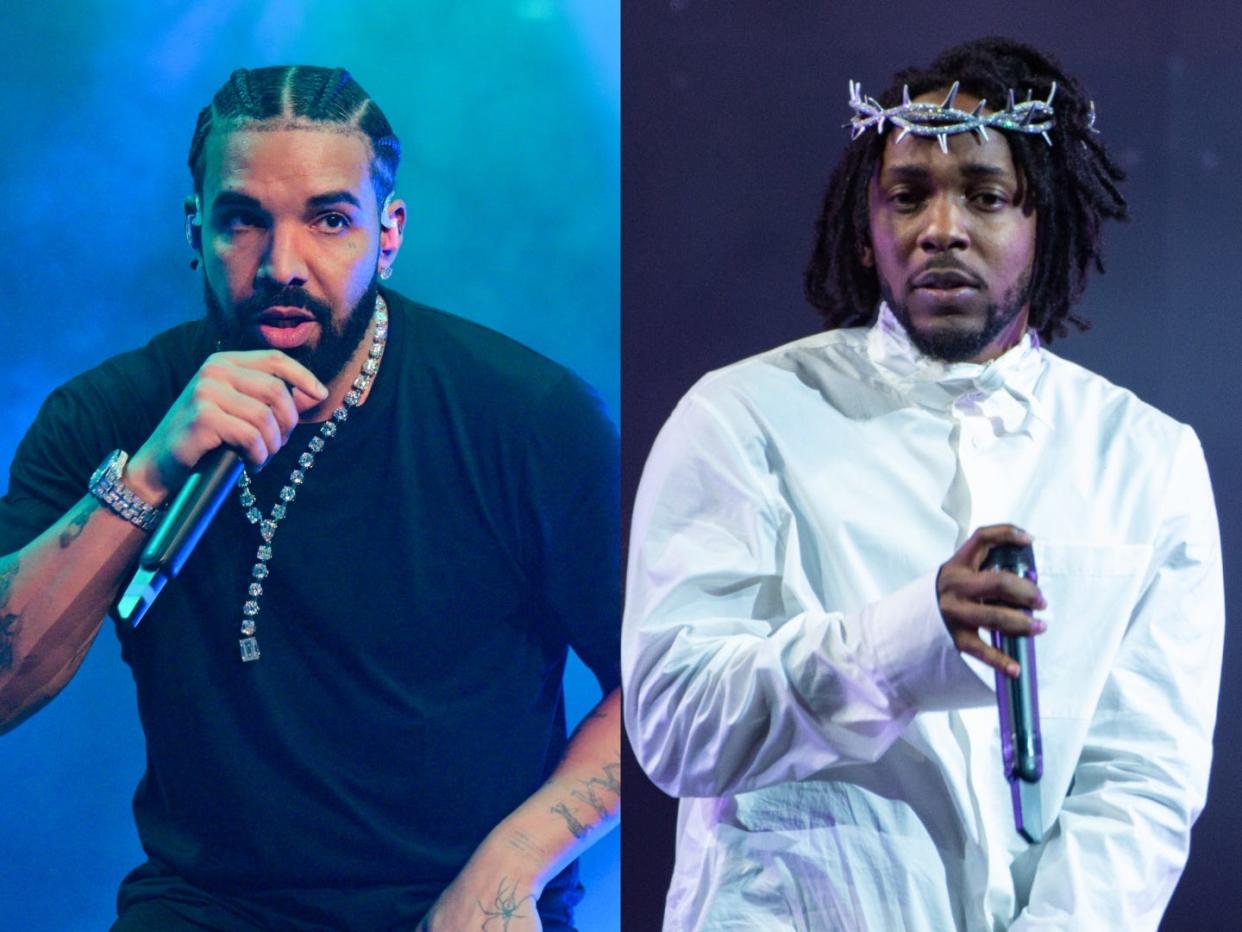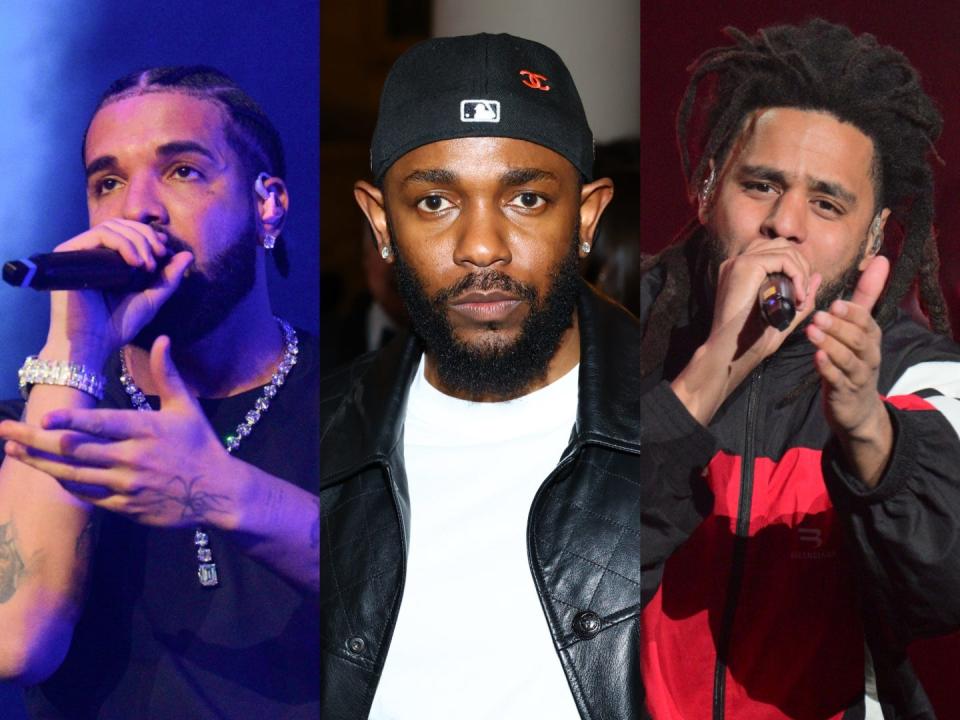Drake and Kendrick Lamar could sue each other for defamation over accusatory slurs exchanged in their diss tracks, says lawyer

- Oops!Something went wrong.Please try again later.
- Oops!Something went wrong.Please try again later.
In a bitter public feud, hip-hop stars Drake and Kendrick have exchanged personal slurs.
Since March, the two have traded increasingly personal and aggressive diss tracks.
An attorney told BI what it would take for one of them to sue for defamation successfully.
After weeks of the bitter public feud between Drake and Kendrick Lamar finally looks like it's over — or at least dying down.
The two rap artists' long-running beef was reignited in March with the release of Future and Metro Boomin's track "Like That," which featured a verse from Lamar that aimed at Drake and another contemporary, J. Cole.
It sparked responses from both Drake and Cole, but the latter quickly excused himself, leaving just Drake and Lamar to duke it out. And the rap stars didn't hold back trading a series of increasingly aggressive and unpleasant diss tracks.
First, Drake dropped "Push Ups" and "Taylor Made Freestyle," two tracks aimed at Lamar.
Their legions of fans encouraged the beef and eagerly awaited the responses.
Less than 72 hours later, Lamar released "6:16 in LA," sparking another response from Drake ("Family Matters"). It provoked two more jabs from Lamar ("Meet the Grahams" and "Not Like Us"), which led to another rebuttal from Drake ("The Heart Part 6").
The latter of these songs got excruciatingly personal, with both stars dropping into their lyrics serious — although crucially, unverified — allegations about domestic violence, pedophilia, and harboring secret children.

The Diss tracks that rappers use to prove themselves while also lyrically decimating their rivals have largely gone out of style since their heyday in the 80s and 90s.
But while the Drake-Kendrick feud was initially seen as some friendly competition between the two hip-hop heavyweights, the fact that they have leveled potentially career-ending accusations at each other has opened up the possibility that their war of words could move out of the recording studio and into the courtroom.
There is no precedent of rappers suing for defamation over the contents of a diss track
"Has anyone ever filed a defamation lawsuit over a diss track before?" Matt Ford, a legal reporter at the New Republic, joked on X earlier this week, seemingly referring to the increasingly salacious aspect of Drake and Kendrick's feud.
While the answer is no, that's not to say it couldn't happen.
Daliah Saper, a principal attorney at Saper Law who specializes in defamation cases, told Business Insider that while either one of them — especially Drake, given the serious, repeated accusations of pedophilia from Lamar — might be tempted to get the law involved to mitigate any reputational damages.
However, the legal benchmarks for a successful defamation suit are high for public figures.
"Because they're both famous, then they would have this added heightened pleading standard," Sapar said.
She explained that, unlike private individuals who only need to show that their alleged defamers acted negligently, public figures must prove that those making defamatory statements against them acted with "actual malice," meaning they knew their statement was false or they acted with reckless disregard for the truth.
Saper said the key to any suit is ascertaining "if the listening public — people who hear these songs — construe them to be just jabs or actual allegations." The real question is, 'Do people now think Drake is a pedophile?'" she said.
In the days after Lamar released his back-to-back diss tracks "Meet the Grahams" and "Not Like Us," a video of the Canadian rapper appearing to fondle a 17-year-old fan onstage has resurfaced online,
On the former song, Lamar accused Drake of being a "predator" who keeps "sex offenders … on a monthly allowance" at his record label, OVO.
In the latter, Lamar outright called Drake and his entourage pedophiles:"' Certified Lover Boy'? Certified pedophiles," he raps in an apparent reference to the singer's 2021 album.
Saper said: "If he was my client, I would have that serious conversation: 'Are you so adamant about the falsity of the statements that a mere PR campaign or responsive rap is insufficient to mitigate the harm? Or are you at rock bottom now and you can't come back from this?'"
So far, Drake has chosen to go for the option of a responsive rap, addressing the criticism head-on in "The Heart Part 6."
However, his defense — that he is "way too famous for this shit you just suggested" and would have already been arrested if there was any veracity to the claims — has been received as a somewhat tone-deaf move,.
The #MeToo movement has proved that famous sex offenders, such as Harvey Weinstein, operated in plain sight thanks to the protection and power their fame and success afforded them.
On the comeback track, Drake also addressed Lamar's claim that he secretly fathered a daughter with another woman five years before the birth of his son, Adonis, 6, whom he shares with French artist Sophie Brussaux.
"The ones that you're getting your stories from, they're all clowns," Drake raps. "We plotted for a week and then we fed you the information/ A daughter that's 11 years old, I bet he takes it."
However, by admitting that he intentionally passed Lamar fake intel about a secret daughter in the hope that his opponent would turn it into fodder for a rap, Saper said Drake may have jeopardized any standing he would have in court.
If what Drake raps is true, it "would just undermine any claim that Lamar acted with reckless disregard for the truth," she noted.
Ultimately, it seems unlikely that either rapper will end up suing for defamation over the slur-laden diss tracks. Any reputational damage suffered is survivable compared to the career suicide of being the first rapper to for defamation over the contents of a diss track.
Indeed, their careers have benefited from this high-profile feud, with both enjoying boosted streams and sales over the last few weeks.
"I do think it's giving them each notoriety. They're already incredibly famous, but this is elevating their music to another level," Saper noted. "It's probably ultimately a great PR play for both of them."
Read the original article on Business Insider

